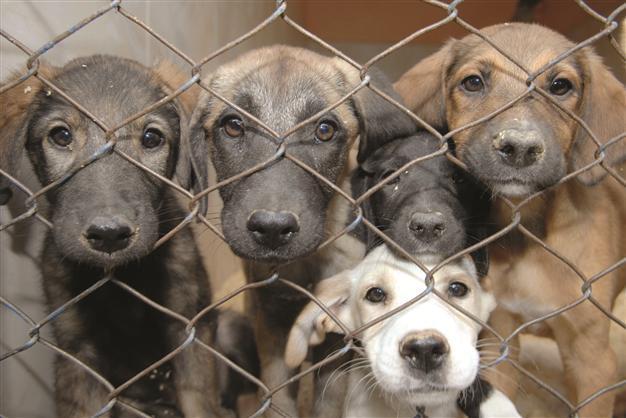New law fails to please animal welfare groups
ANKARA - Hürriyet Daily News

This file photo shows strays in a shelter. Activists claim the new regulations will lead to a mass killing of cats and dogs, whether they are domestic pets or strays. AA photo
An amendment to the Animal Protection Law that would make bestiality, currently only considered a misdemeanor, punishable by jail time has been introduced by the government. The same amendment will also increase fines for crimes committed against animals and mandate that stray animals be vaccinated, spayed or neutered and cared for in areas of natural land defined by local municipalities until an adoption can be arranged.The same amendment outlines the establishment of provincial protection boards led by deputy mayors and composed of environment and urban planning directors, education directors, muftis and representatives of civil society organizations. “The opportunities for shelter concerning stray animals will be carried out by the municipalities,” it says.
People failing to respect interdictions about animals will be charged with monetary fines ranging between 80 and 300 Turkish Liras per animal while those charged have with having had sexual intercourse with animals will be imprisoned for up to one year. Under the current law people convicted of bestiality are punished with fines of 250 liras.
Mass killing claims
Animal rights activists, however, have concerns about the amendment and are preparing to raise their voice against it. They claim the new regulation will lead to a mass killing of cats and dogs, whether they are domestic pets or strays.
Speaking to the Hürriyet Daily News, Hülya Yalçın who chairs the animal rights commission of the Istanbul Bar Association said the law should not pass through Parliament. She said she was personally calling members of Parliament to inform them of the consequences of passing this amendment.
“Whoever says yes to this law is a murderer,” she said. “This law was supposed to protect animals, but instead it plans to cut down on the animals people would like to keep in their houses. It also foresees that no animal should be allowed on the streets.
They will be collected, vaccinated, fixed and taken to remote corners of the city to live in deserted areas that are referred to as Natural Parks. I don’t know where these parks are and I don’t know how we will be able to monitor the animals’ welfare there. How these animals will live or on what they will feed is a mystery.
”The new amendment has only one positive aspect, but it is not enough risk banning stray animals altogether, according to Yalçın. “The law foresees the punitive containment of animal abusers, which animal rights’ activists have long demanded to protect stray animals from rape and torture. But if the law does not allow for stray animals, I really wonder what this last article is good for.”
Requirements
The number of animals allowed as pets in one home will also be regulated in the new amendment.
Experimental studies on animals will only be allowed to be conducted by researchers who will participate in instructional programs arranged by ethical committees and are then certified to conduct experiments on animals.
In the current law those who “produce an animal that constitutes a danger, such as a pit bull terrier or Japanese Tosa, to have them adopted, to bring them into the country, to sell or advertise them, to exchange, display or give them as a present,” run the risk of being charged with administrative fines of around 2,500 liras per animal and having their animals taken.
With the new draft law those who do not respect this interdiction will receive a two year prison sentence rather than face a fine.
Yet, while the current act anticipates penalizing “those who get the animals adopted,” the draft law will penalize “the ones who adopt these animals.” In this case, when the draft law becomes a bill not only will those who put animals deemed dangerous up for adoption be sentenced with prison terms, but those who adopt such animals will also face jail time.
















